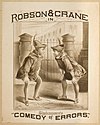Angoor (1982 film)
Thank you for being part of the Bharatpedia family! 0% transparency: ₹0 raised out of ₹100,000 (0 supporter) |
| Angoor | |
|---|---|
| File:Angoor 1982 poster.jpg Poster | |
| Directed by | Gulzar |
| Produced by | Jai Singh |
| Written by | Gulzar |
| Starring | Sanjeev Kumar Moushumi Chatterjee Deepti Naval Deven Verma Aruna Irani |
| Music by | R. D. Burman |
| Cinematography | M. Sampat |
| Edited by | Waman Bhonsle Gurudutt Shirali |
Production company | A. R. Movies |
Release date | 5 March 1982 |
| Country | India |
| Language | Hindi |
Angoor (transl. Grape) is a 1982 Indian Hindi-language comedy film starring Sanjeev Kumar and Deven Verma in dual roles, and directed by Gulzar.[1][2] It is a remake of the Indian film Do Dooni Char which was a remake of 1963 Bengali language comedy film Bhranti bilas, that is based on Ishwar Chandra Vidyasagar's Bengali novel by the same name, which itself is based on Shakespeare's play The Comedy of Errors and is again getting adapted by Rohit Shetty as Cirkus.[3] All characters are innocent and destiny plays the main role in bringing all characters to one place. Most of the other films are generally based on false characters and deliberately make false statements to fool others.[4]
Plot[edit]
The film is about two pairs of identical twins separated at birth and how their lives go haywire when they meet in adulthood.
Raj Tilak (Utpal Dutt) and his wife (Shammi) are on a trip with their twin sons, both of whom they call Ashok. Since they look the same, they should be called the same, is Mr Tilak's reasoning. As fate would have it, they adopt another set of twins, both of whom they call Bahadur. An unfortunate accident then divides the family, leaving both parents with one child out of each pair of twins.
A few years later, Ashok (Sanjeev Kumar) is married to Sudha (Moushumi Chatterjee) and Bahadur (Deven Verma) is married to Prema (Aruna Irani). They all stay together with Sudha's younger sister Tanu (Deepti Naval). Into their lives enter the other Ashok, a detective novel aficionado, and Bahadur, a bhang (an edible form of cannabis which has been used in India since before the Vedic period) lover. Now there are two Ashoks and two Bahadurs in the same city. This is more than their families, the Jeweller, the Taxi Driver and the Inspector can handle.
Cast[edit]
- Sanjeev Kumar in a double role as twin brothers Ashok Tilak and Ashok Tilak.[lower-alpha 1]
- Moushmi Chatterjee as Sudha Tilak, Ashok's wife
- Deepti Naval as Tanu, Sudha's sister
- Deven Verma in a double role as twin brothers Bahadur and Bahadur.[lower-alpha 1]
- Aruna Irani as Prema, Bahadur's wife
- Yunus Parvez as Mansoor Miyan, Chhedilal's worker
- C. S. Dubey as Chhedilal, a jeweller
- T. P. Jain as Ganeshilal, a diamond merchant
- Padma Chavan as Alka, Ashok's friend
- Ram Mohan as Taxi Driver
- Shammi as Ashok's mother
- Utpal Dutt as Raj Tilak, Ashok's father
- Raj Kumar Kapoor as Inspector Sinha
- Arjun Chakraborty as an office assistant under Ashok Tilak
- Kamaldeep as 'Angoor' landlord
Soundtrack[edit]
| Song | Singer |
|---|---|
| "Hothon Pe Beeti Baat" | Asha Bhosle |
| "Roz Roz Daali Daali" | Asha Bhosle |
| "Preetam Aan Milo" | Sapan Chakraborty |
Awards and nominations[edit]
- 30th Filmfare Awards
- Won: Best Comedian - Deven Verma[5]
- Nominated: Best Actor - Sanjeev Kumar
Home media[edit]
The DVD version of the film was released by IndiaWeekly under its own label.[6]
Notes[edit]
References[edit]
- ↑ "Gulzar's 'Angoor': He had 'a metre in mind, the rhythm of a sentence in his brain'". Scroll.in. 13 February 2019. Archived from the original on 11 July 2020. Retrieved 11 July 2020.
- ↑ "Tha making of Angoor". The Telegraph, Calcutta. 11 February 2019. Archived from the original on 13 July 2020. Retrieved 11 July 2020.
- ↑ Salam, Ziya Us (21 May 2016). "Angoor (1982)". The Hindu. Archived from the original on 26 July 2020. Retrieved 11 July 2020.
- ↑ Singh, Harneet (25 March 2011). "Just breathe and reboot". Indian Express. Archived from the original on 23 February 2021. Retrieved 23 February 2021.
- ↑ "List of Filmfare Award Winners and Nominations, 1953-2005" (PDF). Archived (PDF) from the original on 12 June 2009. Retrieved 30 March 2012.
- ↑ "Angoor DVD". IndiaWeekly. Archived from the original on 28 April 2012. Retrieved 20 February 2013.
External links[edit]
- Hindi-language movies
- 1982 films
- 1980s Hindi-language films
- Indian films
- Films scored by R. D. Burman
- Modern adaptations of works by William Shakespeare
- Films based on The Comedy of Errors
- Twins in Indian films
- 1982 comedy films
- Films based on Indian novels
- Indian films based on plays
- Films with screenplays by Gulzar
- Films directed by Gulzar
- Indian comedy films
- Hindi-language comedy films

